裕兴新概念英语第一册笔记完整版
(完整版)裕兴新概念第一册笔记(115-116)
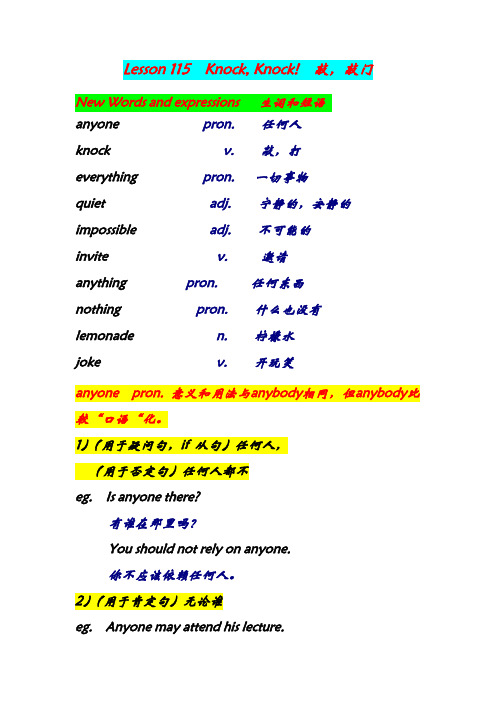
Lesson 115 Knock, Knock! 敲,敲门New Words and expressions 生词和短语anyone pron. 任何人knock v. 敲,打everything pron. 一切事物quiet adj. 宁静的,安静的impossible adj. 不可能的invite v. 邀请anything pron. 任何东西nothing pron. 什么也没有lemonade n. 柠檬水joke v. 开玩笑anyone pron. 意义和用法与anybody相同,但anybody比较“口语“化。
1)(用于疑问句,if 从句)任何人,(用于否定句)任何人都不eg. Is anyone there?有谁在那里吗?You should not rely on anyone.你不应该依赖任何人。
2)(用于肯定句)无论谁eg. Anyone may attend his lecture.任何人都可以听他演讲。
knock1) 敲,打eg. I knocked at the door, but there was no answer.我敲了门,但没有回应。
He came in without knocking.他没有敲门就近来了2)用力打,揍eg. He knocked me on the head.他打我的头。
3)以…碰撞…,碰撞eg. He knocked his leg against the desk.他的腿撞到了那张书桌。
The man knocked against me on purpose。
那个人故意撞我。
knock down 把(人)击倒,(车等)撞倒(人)eg. His son was knocked down by a car.他的儿子被汽车撞倒knock it off (口语)住手,住嘴everything pron. 一切事物,每样事物eg. Everything is good well.万事如意。
裕兴新概念学习笔记第一册(81-84)
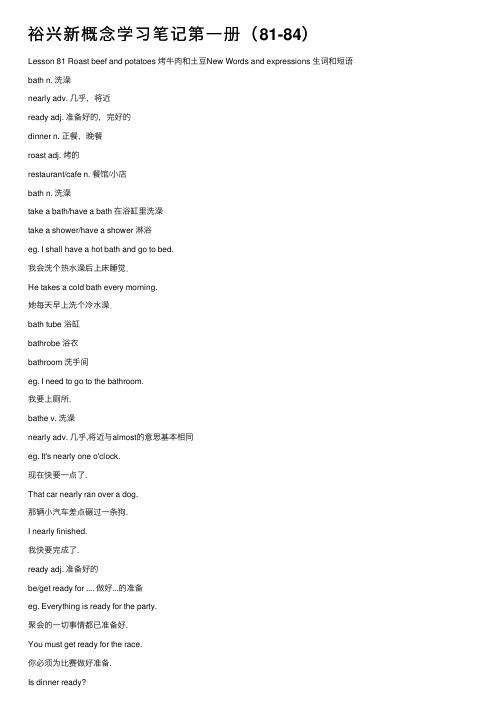
裕兴新概念学习笔记第⼀册(81-84)Lesson 81 Roast beef and potatoes 烤⽜⾁和⼟⾖New Words and expressions ⽣词和短语bath n. 洗澡nearly adv. ⼏乎,将近ready adj. 准备好的,完好的dinner n. 正餐,晚餐roast adj. 烤的restaurant/cafe n. 餐馆/⼩店bath n. 洗澡take a bath/have a bath 在浴缸⾥洗澡take a shower/have a shower 淋浴eg. I shall have a hot bath and go to bed.我会洗个热⽔澡后上床睡觉.He takes a cold bath every morning.她每天早上洗个冷⽔澡.bath tube 浴缸bathrobe 浴⾐bathroom 洗⼿间eg. I need to go to the bathroom.我要上厕所.bathe v. 洗澡nearly adv. ⼏乎,将近与almost的意思基本相同eg. It's nearly one o'clock.现在快要⼀点了.That car nearly ran over a dog.那辆⼩汽车差点碾过⼀条狗.I nearly finished.我快要完成了.ready adj. 准备好的be/get ready for .... 做好...的准备eg. Everything is ready for the party.聚会的⼀切事情都已准备好.You must get ready for the race.你必须为⽐赛做好准备.Is dinner ready?晚餐准备好了吗?be ready to do1) 已准备好做 ...eg. I am ready to go.我已准备好出发.2) 愿意做...eg. She is always ready to help others.她总是乐意助⼈.3) 眼看就要...eg. The rope is ready to break.绳⼦眼看就要断了.The child is ready to burst into tears.那⼩孩眼看就要⼤哭起来.dinner1) n. 餐,正餐(三餐中的主要⼀餐)eg. It's time for dinner.该进晚餐了.Dinner is ready.晚餐准备好了.2) n. (正式的) 宴会,晚会dinner party 宴会give a dinner 设宴be at dinner ⽤餐中have breakfast 吃早餐have lunch 吃午餐have supper 吃晚餐have dinner 吃晚饭restaurant n. 饭馆、餐馆cafe n. ⼩餐馆(在英国通常不供应酒类) cafeteria n. ⾃动⾷堂; ⾃助餐厅inn n. ⼩酒馆,⼩旅馆roast1) adj. 烤过的a roast chicken 烤鸡Beijine Roast Duch 北京烤鸭2) v. 烤、烧eg. I roasted a chicken.我烤了⼀只鸡.The beef is roasting nicely in the oven.⽜⾁在烤箱⾥烤得正好呢.3) n. 烤⾁eg. I want some roast.我想要⼀些烤⾁.grill v. (⽤烤架) 烧烤n. 烤架;烧烤的⾁类⾷物grill room 烤⾁馆bake v. 烤( ⾯包, 饼, 通常指在炉中烤)eg. Mother bakes bread or cookies on every Sunday.母亲每逢星期⽇就会烤⾯包或饼⼲.The bread is baking.⾯包正在烤着.baker ⾯包师/商at the baker's 在⾯包店⾥fry v. 油煎deep fry 油炸eg. Can you fry fish?你会煎鱼吗?fried adj. 油煎的deep fried adj. 油炸的fried fish n. 油炸鱼fried potatoes n. 油炸⼟⾖fried eggs n. 煎鸡蛋stew v. 焖,炖/ n. 炖⾁,焖菜eg. I have stewed the beef for two hours.⽜⾁已炖了两⼩时.stewed adj. 焖煮的stew pan n. 炖锅boil v. 烧开,煮熟boil an egg 煮鸡蛋instant boil 涮instant boil mutton 涮⽺⾁TEXT 课⽂Question: Why is Carol disappointed? 卡罗尔为什么感到失望? Listen to the tape then answer this question.听录⾳,然后回答问题。
(完整版)裕兴新概念第一册学习笔记(109-110)
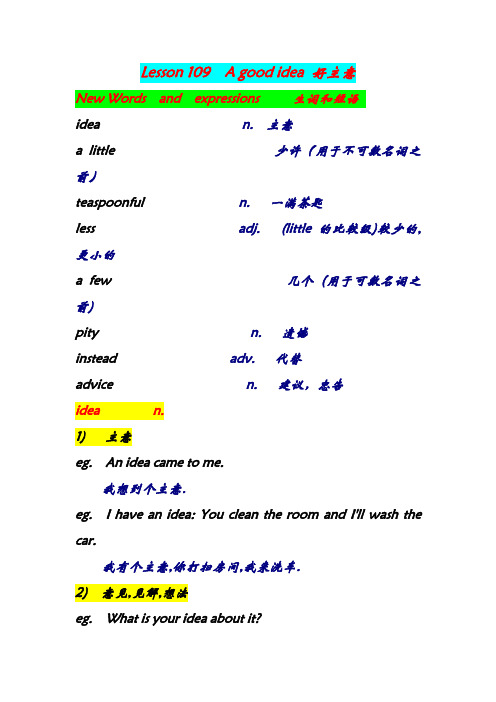
Lesson 109 A good idea 好主意New Words and expressions 生词和短语idea n. 主意a little 少许(用于不可数名词之前)teaspoonful n. 一满茶匙less adj. (little 的比较级)较少的,更小的a few 几个(用于可数名词之前)pity n. 遗憾instead adv. 代替advice n. 建议,忠告idea n.1) 主意eg. An idea came to me.我想到个主意.eg. I have an idea: You clean the room and I'll wash the car.我有个主意,你打扫房间,我来洗车.2) 意见,见解,想法eg. What is your idea about it?关于这件事你的意见任何?eg. I don't like the idea that money is everything.我不喜欢金钱就是一切的想法.a little 少许(置于不可数名词之前)eg. Will you eat a little cake?你要不要吃点蛋糕?little 几乎没有,很少的(置于不可数名词之前)eg. I have little time for reading.我几乎没有时间读书.There is little hope of his recovery.他复原的希望极为渺茫.a little 与littlea little 表示"少", 但是还有一点,即重点放在"有".而little 则表示"有.但是极少",即重点强调"几乎没有"eg. There's a little wine left in the bottle.瓶子里还剩下一点酒.( 原来以为是空的,但发现还"有", 是较为乐观的看法)There's little wine left in the bottle.瓶子里还剩下多少酒.( 原来以为是更多,但发现"剩下很少", 是悲观的看法)only a little 只有一点点quite a little 相当多的,颇多的teaspoonful n. 一茶匙的量teaspoon n. 茶匙handful n. 一把a handful of sand 一把沙子mouthful n. 满嘴a mouthful of food 满嘴饭eg. Don't talk with a mouthful of food.嘴里塞满了饭时,不要讲话.less1) adj. 较少的,更小的(little的比较级)eg. I will have less work to do tomorrow.我明天的工作就更少了.2) 作不定代词eg. I know little about it , but he knows even less.对此我了解甚少,而他知道的更少.3) adv. 更不(与more 相对)eg. This story is less interesting.这个故事更没意思.After the exam, he works less hard.考试以后,他学习更不努力了.a few 几个(通常置于可数名词之前)in a few days 过两三天few 和a fewfew是"几乎没有"的否定性意见.a few是"有一些"的肯定性意见. 视说话者的想法而定,不一定根据数的大小,因而到底指何种程度的数量要看文章的前后关系而定.not a few 不少的,相当多的eg. Not a few people have made that mistake.不少人犯过这种错误.only a few 仅少数,只有几个....eg. Only a few men were in the room.房间中只有几个男性.quite a few (口语中) 相当多的eg. You will have to wait quite a few weeks.你必须等上好几个礼拜.pity n.1) 遗憾eg. It's a pity that he failed again.真遗憾他再次失败了.What a pity!真可惜! 实在可怜!What a pity(that) she cannot come!他不能来真是遗憾.2) 怜悯,同情eg. He felt pity for the jobless man.他可怜那无业男子. (fell pity)instead adv. 代替eg. I don't like beer , give me coke instead.我不喜欢喝啤酒,给我可乐好了.instead of 代替...,而不eg. I will go to see her instead of you.要去看的是她而不是你.eg. I have to finish my work instead of going out.我必须完成工作,不能外出.advice n. 建议,忠告eg. I asked my teacher for advice on my English.我请老师对我的英语学习给些建议.Let me give you a piece of advice.让我给你个忠告.give him a piece of advice 给他忠告offer him a piece of advice 给他的忠告或建议take his advice 听他的忠告refuse one's advice 不听某人的劝告some advice on... /some advice about .... 有关...的忠告advise v. 忠告,劝告,建议eg. The doctor advised taking a week's rest.那医生建议我休息几周.advise sb to do sth 忠告(某人)做....advise that ....eg. I advised him to stop smoking.= I advised that he (should) stop smoking.我劝他戒烟.TEXT 课文Question: What does Jane have with her coffee?喝咖啡时Jane 吃了什么?Listen to the tape then answer this question.听录音,然后回答问题。
裕兴新概念第一册笔记
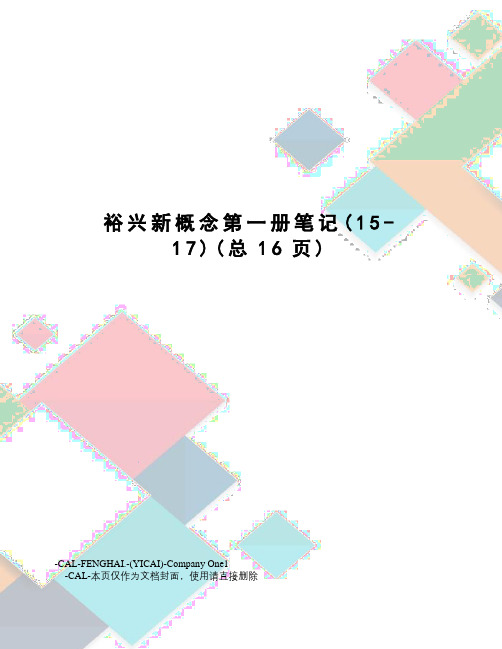
裕兴新概念第一册笔记(15-17)(总16页)-CAL-FENGHAI.-(YICAI)-Company One1-CAL-本页仅作为文档封面,使用请直接删除Lesson 15 Your passports, please. 你的护照. 请. 语音辅音根据发音部位或发音方法的不同分为:爆破音: [p] [b] [t] [d] [k] [g]摩擦音: [f] [v] [θ] [ ð ] [s] [z] [ʃ] [ʒ] [h] [r][f] [v]f oot v estli f e fi v ef ly v aluef ast v ase[θ] [ð]th ird th oughwor th th isbrea th th atclo th wor th yth ank th ese[s] [z]fa c e no s es ue z ooloo s e lo s es et z edpa ss va s eeg: Your nose is on your face.Sue is in the zoo.[θ] [S]th ank s ankth umb s umpa th pa ssmou th mou s eth ick s ick[ʃ] [ʒ]sh ip plea su refi sh mea su reeg. It's a pleasure to visit your ship.The fish is so big and let's measure it.[h] hill/head/hit/hat/horse/house [r] rest/rug/rat/read/roadNew Words and expressions 生词和短语customs n. 海关officer n. 官员girl n. 女孩,姑娘Danish adj.& n. 丹麦的&丹麦人Denmark n. 丹麦friend n. 朋友Norwegian adj. & n. 挪威的&挪威人Norway n. 挪威Passport n. 护照( pass通过,port港口,通过港口通过港口要出示护照)brown adj. 棕色的tourist n. 旅游者customs n. 海关customs duty 海关关税office n. 办公室in the office 在办公室里customs officer 海关官员girl n. 女孩eg. That girl is my daughter.Three girlsboy n. 男孩eg. The boy is her son.The two boys are her sons.Danish n. 丹麦人(国籍);丹麦语 adj. 丹麦的Denmark n. 丹麦(国名)eg. We are Danish.My friend is Danish.My friends are Danish.Is his friend Danish Yes, he is.Are their parents Danish No, they aren't friend n. 朋友eg. Are they your friendsThey are not your friends.friendly adj. 友好的be friendly to sb 对...友好eg. She is friendly to me. 她对我很好. Norwegian n. 挪威人(国籍) ;挪威语 adj. 挪威的Norway n. 挪威(国名)eg. I am from Norway.eg. I am Norwegian.passport n. 护照eg. Her passport is green; mine is brown.Their passports are red.brown adj. 棕色的brown hair 棕色头发tourist n. 旅行者eg. Is she a touristYes, she is.No, she isn'tAre they touristsYes, they areNo, they aren'tGrammar 语法 ---Plural form名词分为可数名词和不可数名词可数名词:officer 官员friend 朋友passport 护照case 箱子umbrella 雨伞不可数名词:water 水tea 茶air 空气coffee 咖啡powder 粉末可数名词分为单数形式和复数形式单数形式: 数量为一的事物a case an egg复数形式: 数量为一个以上的事物 a bus busesa friend friendsa case cases单数变复数的变化规则主要有以下几种:1. 在单数名词后面加"s"an officer officersa tourist touristsa passport passports2. 在以"s" "x" "sh" "ch" 结尾的单数名词变复数时,需在单词后面加"es"a bus busesa dress dressesa box boxesa fox foxesa fish fishesa wish wishesa watch watchesa match watches3. 以元音字母加"y" 结尾的单数名词变复数, 我们在词尾加sa boy boysa toy toysa key keys以辅音字母加"y" 结尾的单数名词变复数, 需把y去掉再加ies.a fly fliesa baby babiesa country countries4. 以o结尾的单数名词变复数时有两种形式,其一是直接在词尾加s; 另一种是在词尾加es.口诀: 黑人英雄爱吃土豆西红柿+esNegro Negroeshero heroespotato potatoestomato tomatoes其他则加 sphoto photosradio radioa man mena goose geesea foot feeta tooth teetha sheep sheep以f或fe结尾的单数名词变成复数,一般把f或fe变成v再加es.a wife wivesa knife knives名词复数的发音规则: 清清浊浊1. 如果名词词尾的发音是一个清辅音那么词尾加的s就发[s]的音.book booksmap mapsmouth mouths以清辅音t结尾的单词,变复数加s的时候,t 与s 共同发[ts].cat catsshirt shirtsskirt skirts2. 如果名词词尾的发音是一个浊辅音或者是词尾是一个元音,那么词尾加的s就发[z]的音.tie tiesdog dogspen pensdoctor doctors以浊辅音d结尾的单词,变复数加s的时候,d 与s 共同发[dz]. bed bedskid kidsfood foods3. 如果名词词尾的发音是:[s] /[z] /[ʃ]/ [ʒ]/[tʃ]/ [dʒ] 词尾加的s 或es 发[iz]dress dressesnose noseswatch watchesfish fishesTEXT 课文Your passports, please.Is there a problem with the Customs officer No, that's fine.海关官员有什么疑问吗不, 没有了.CUSTOMS OFFICER: Are you Swedish海关官员:你们是瑞典人吗GIRLS: No, we are not. We are Danish.姑娘们:不,我们不是瑞典人。
裕兴新概念学习笔记 第一册
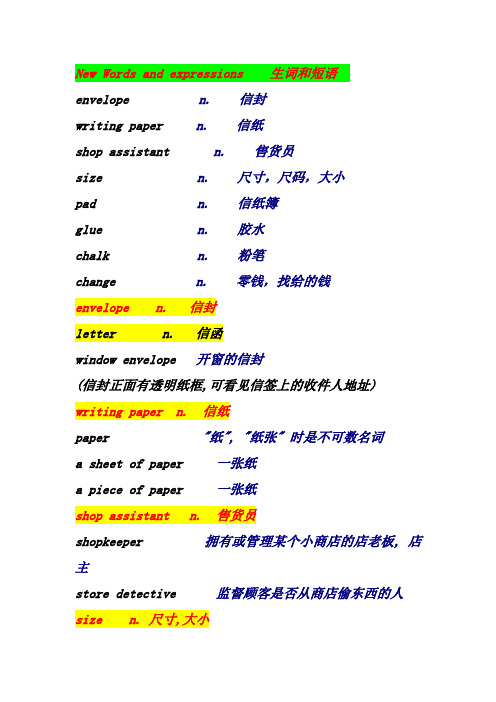
New Words and expressions 生词和短语envelope n. 信封writing paper n. 信纸shop assistant n. 售货员size n. 尺寸,尺码,大小pad n. 信纸簿glue n. 胶水chalk n. 粉笔change n. 零钱,找给的钱envelope n. 信封letter n. 信函window envelope 开窗的信封(信封正面有透明纸框,可看见信签上的收件人地址) writing paper n. 信纸paper "纸", "纸张" 时是不可数名词a sheet of paper 一张纸a piece of paper 一张纸shop assistant n. 售货员shopkeeper 拥有或管理某个小商店的店老板, 店主store detective 监督顾客是否从商店偷东西的人size n. 尺寸,大小1. 尺码,号 (衣服、鞋、帽等的)eg. What size does she want ?What size do you wear?This blouse is your size.这件衬衣是你的尺码.2. 大小(尺寸,体积,规模,身体等的), 多少(数量) eg. There are house of all sizes in that town.那个镇子有大大小小各式房子.pad n. 信签簿(指可一张张扯用的本子)glue n. 胶水(不可数名词)eg. I want some glue.---- Do you have any glue?---- No,I don'tchalk n. 粉笔coloured chalk 彩色粉笔change1. n. 找头; 零钱eg. Here is your change.这是你的找头.I have no change.我身上没有零钱.2. 变化;转换eg. There is a big change in his mind.他的思想有很大的变化.3. v. 改变eg. She never changes her mind.她从不改变主意.TEXT 课文Question: Does the lady buy any chalk?Listen to the tape then answer this question.听录音,然后回答问题。
[英语学习]裕兴新概念第一册学习笔记
![[英语学习]裕兴新概念第一册学习笔记](https://img.taocdn.com/s3/m/f8926fd8bb68a98270fefa44.png)
Lesson 117 Tommy's breakfast 汤米的早餐New Words and expressions 生词和短语dinning room(hall) 饭厅coin n. 硬币mouth n. 嘴swallow v. 吞下later adv. 后来toilet n. 厕所,盥洗室dinning room 饭厅,餐室(家中的)dinning 餐厅,餐厨用品dinning table 餐桌dinning car 餐车coin n. 硬币a silver coin 银币toss a coin 抛硬币(打赌正面和反面)eg. Could you change the one-dollar bill for coins?我用1美元纸钞和你换硬币好吗?Pay a person bake in his own coin.以其人之道还治其人之身.mouth n. 嘴eg. Open your mouth.张开你的嘴.-Don’t talk with your mouth full!-嘴里塞满食物时不要说话!Shut your mouth!(口语)闭嘴It sounds funny in your mouth.这种话由你的口中说出来,听起来就很可笑。
by word of mouth 口头上from hand to mouth 勉强糊口from mouth to mouth 口口相传have a big mouth 大嘴巴,嘴不严swallow1) v. 吞…, 咽…eg. He swallowed (up) the medicine with water.他把药和水一起吞下1) n. 一口(一口的量)take a swallow of beer 喝一口啤酒at one swallow 一饮而尽★ swallow v. 吞下① v. 吞下,咽下Tommy had swallowed the coins.汤米已经吞下了那硬币.②v. 抑制,使不流露I tried hard to swallow my doubts.我强忍着不露出怀疑的神色。
裕兴新概念英语第一册笔记(完整版)
裕兴新概念英语第一册笔记完整版΄1)v. 原谅΄eg. Excuse me.请原谅,劳驾。
2)n. 借口΄eg. It΄s an excuse.΄me pron. 我(宾格:用来做宾语的。
)΄eg. He loves me.他爱我.΄eg. She cheats me.他骗我.΄eg. Please tell me.他告诉我.Excuse me 的用法这个短语经常被译作“对不起”,但它并不表示你有什么过错,而是说你要打搅别人,所以常被译作“劳驾”。
1)为了要引起别人的注意΄eg. Excuse me. Is this you handbag?2)要打扰某人或要打断别人话΄eg. Excuse me . May I ask you a question?3) 向陌生人问路΄eg. Excuse me. Could you please tell me the way to the railway station?4) 向某人借东西΄eg. Excuse me. Can I borrow your pen?5) 需要从别人身边挤过或让别人给自己让路΄eg. Excuse me. Could you please make some room for me?6) 要求在宴席或会议中途中离开一会儿eg. Excuse me. May I lease for a little while?΄sorry 用于当你做错事而向别人道歉的时候,表示“对不起”。
1)请问几点了?΄eg. Excuse me. What time is it?2) 不小心把水弄到了别人的身上。
΄eg. Sorry. 或者 I΄m sorry!3) 对不起,我先失陪一下΄eg. Excuse me.4) 误解了别人的意思΄eg. Sorry.΄yes1)adv. 是的(对一般疑问句的肯定回答)΄eg. Are you mad?--Yes, I am.2)经常用于应答,表示“什么事”。
裕兴新概念第一册笔记
Lesson1: Excuse me!Excuse me! (常用于与陌生人搭话)Yes? (对excuse me的回答)Is this your handbag? (陈述句:this is my handbag)Pardon? (要求对方重复所说的话)Is this your handbag?Yes, it is.Thank you very much.一般疑问句:把系动词(am,is,are)放在句首;Eg:this is a handbag.(这是一个手提包。
肯定句)Eg: is this a handbag?肯定回答:yes ,it is. 否定回答:no, it isn‟t.Eg:that is your pencil. 一般疑问句:is that your pencil?肯定回答:yes it is , 否定回答:No,it is‟t.否定句:只需要把Not加在系动词的后面。
Eg:This is my handbag/that is your carWhose handbag it is ?(这是谁的手提包?)It is the lady‟s handbag.(它是这位女式的手提包)Lesson 3:Sorry sir.My coat and my umbrella please. (省略了动词give)(give sb sth 把某物给某人:sb是:somebody 的缩写,表标某人/sth:是something的缩写,表示某物)(give me my umbrella and my coat please)Here is my ticket. (here 这儿,在这儿反议词there: 那,在那,此句为倒装句,副词here/there 置于句首时,主谓要倒装,正常用的语序为:my ticket is here)(ticket:票/an air ticket 一张飞机票//a train ticket :一张火车票//a bus ticket :一张公共汽车票//a cinema ticket一张电影票/Thank you sir. (sir:是先生,对不相识的男子或男性上级的一种尊称,一般单独使用,不与姓氏连用,Mr:先生,与姓氏连用,不可单独作用)Number five. (Number +基数:one ,two,three……表示第几,类似的用有:page one 第一页, lesson two :第二课, day three:第三天)Here is your umbrella and your coat. (此句也是倒装句,下正常语序为:your umbrella and your coat is here)(and表示“和”,是连词,连续两个并列成份,位置可以互换。
裕兴新概念第一册笔记(111-114)
Lesson 111 The most expensive model 最昂贵的型号New Words and expressions 生词和短语model n. 型号afford v. 付得起(钱)deposit n. 预付定金instalment n. 分期付款price n. 价格millionaire n. 百万富翁fashion model 时装模特model1) n. 型号, 式样eg. This washing machine is the latest model这台洗衣机是最新型的.2) n. 模型model plane 飞机模型3) n. 模范、榜样eg. He is a model of diligence.他是勤勉的榜样.4) n. 模特儿a fashion model 时装模特afford1) v. 付得起(钱)afford sth 买得起某物afford to do 有足够的(金钱/时间)做...(通常与can, could, be able to 连用; 多用于否定句,疑问句) eg. We cannot afford a new car. /We cannot to buy a new car.我们买不起新车.How can you afford so much money for a bicycle?你怎么付得起这么多钱去买一部自行车呢?I'll be able to afford a week's vacation this summer.今年夏天我可腾出一星期的时间去度假.2) 给与, 供给eg. Music affords us pleasure. /Music affords pleasure to us.音乐给我们快乐.deposit1) n. 预付定金,押金,保证金(通常以单数形式表示)eg. Make a deposit of 500 dollars on a new car.为买新车付500美元的定金.2) n. 存款draw out one's deposit 提取存款make a deposit 存入款项make a large deposit 存入巨额款项a current deposit 活期存款a fixed deposit 定期存款3) v. 付定金eg. He deposited 100 dollars on the motorcycle.他付了100美元的定金(保证金)买那部摩托车.4) v. 把(钱)存起来eg: I deposited 50 dollars in my savings account.我存50 美元到我的储蓄存款账户内.deposit money in a bank 把钱存入银行instalment1) n. 分期付款,分期摊付的钱in instalments 以分期付款的方式by instalments 分期付款on instalments 以分期付款的方式eg. He paid for the car in instalments of$200 a month for three years.他以分期付款方式买那部车,每月200元,分3年付款. 2) n. (连载刊物的) 一回the final instalment 最后一期price1) n. 价格(用复数形式prices 指物价)eg. The prices of vegetable are going up.蔬菜价格正在上涨.the market price 市场价(1) 表示price 的"高、低"时,形容词用high,low; 表示东西的"贵,便宜"时, 用expensive, cheap.eg. The prices of watchs are very low at that store.Waches are very cheap at that store.那家店的手表很便宜.(2) 询问价钱时,price与what连用eg. What is the price of this camera?/How much is this camera?这个照相机多少钱?millionaire n. 百万富翁billionaire n. 亿万富翁(大富翁)Grammar 语法形容词与副词都有三个等级,原级,比较级和最高级.原级常用于"as+adj./adv.原级+as(连词)引导的从句".从句中常省去意义与主句相同的部分,在上下文清楚的情况下,整个as从句都可以省去.eg. Bill is as fat as Tom (is).比尔和汤姆一样胖.He runs as fast as you (do).他和你跑得一样快.在"as....as" 中间使用的形容词和副词一定要用原级.中间也可以使用名词,但要遵循以下原则:"as+adj.+a(an)+n.(可数单)+as""as+many+n.(可数复)+as""as+much+n.(不可数)+as"eg. He is as brave a man as a hero.他像一个英雄一样勇敢.She read as many books as you did.她读过的书和你一样多.He drank as much water as he could.他尽可能地多喝水.有时为了避免重复,在从句中常用the one 代替单数可数名词,用those代替复数名词,用that 代替不可数名词和某些可数名词.eg. I hope it was as good as the one you give me.我希望这个和你给我的一样好.The girls in your class are as pretty as those in our class.你们班的女生和我们班的女生都一样美丽.The climate of Guilin is as good as that of Kunming.桂林的气候和昆明的一样好.否定原级用"not as ...as"结构,也可用"less...than"结构.eg. This question is not as important as that one.This question is less important than that one.这个问题没有那个问题重要.TEXT 课文Listen to the tape then answer this question.听录音,然后回答问题。
裕兴新概念英语第一册笔记(完整版)
裕兴新概念英语第一册笔记完整版΄1)v. 原谅΄eg. Excuse me.请原谅,劳驾。
2)n. 借口΄eg. It΄s an excuse.΄me pron. 我(宾格:用来做宾语的。
)΄eg. He loves me.他爱我.΄eg. She cheats me.他骗我.΄eg. Please tell me.他告诉我.Excuse me 的用法这个短语经常被译作“对不起”,但它并不表示你有什么过错,而是说你要打搅别人,所以常被译作“劳驾”。
1)为了要引起别人的注意΄eg. Excuse me. Is this you handbag?2)要打扰某人或要打断别人话΄eg. Excuse me . May I ask you a question?3) 向陌生人问路΄eg. Excuse me. Could you please tell me the way to the railway station?4) 向某人借东西΄eg. Excuse me. Can I borrow your pen?5) 需要从别人身边挤过或让别人给自己让路΄eg. Excuse me. Could you please make some room for me?6) 要求在宴席或会议中途中离开一会儿eg. Excuse me. May I lease for a little while?΄sorry 用于当你做错事而向别人道歉的时候,表示“对不起”。
1)请问几点了?΄eg. Excuse me. What time is it?2) 不小心把水弄到了别人的身上。
΄eg. Sorry. 或者I΄m sorry!3) 对不起,我先失陪一下΄eg. Excuse me.4) 误解了别人的意思΄eg. Sorry.΄yes1)adv. 是的(对一般疑问句的肯定回答)΄eg. Are you mad?--Yes, I am.2)经常用于应答,表示“什么事”。
- 1、下载文档前请自行甄别文档内容的完整性,平台不提供额外的编辑、内容补充、找答案等附加服务。
- 2、"仅部分预览"的文档,不可在线预览部分如存在完整性等问题,可反馈申请退款(可完整预览的文档不适用该条件!)。
- 3、如文档侵犯您的权益,请联系客服反馈,我们会尽快为您处理(人工客服工作时间:9:00-18:30)。
裕兴新概念英语第一册笔记完整版΄1)v. 原谅΄eg. Excuse me.请原谅,劳驾。
2)n. 借口΄eg. It΄s an excuse.΄me pron. 我(宾格:用来做宾语的。
)΄eg. He loves me.他爱我.΄eg. She cheats me.他骗我.΄eg. Please tell me.他告诉我.Excuse me 的用法这个短语经常被译作―对不起‖,但它并不表示你有什么过错,而是说你要打搅别人,所以常被译作―劳驾‖。
1)为了要引起别人的注意΄eg. Excuse me. Is this you handbag?2)要打扰某人或要打断别人话΄eg. Excuse me . May I ask you a question?3) 向陌生人问路΄eg. Excuse me. Could you please tell me the way to the railway station?4) 向某人借东西΄eg. Excuse me. Can I bor row your pen?5) 需要从别人身边挤过或让别人给自己让路΄eg. Excuse me. Could you please make some room for me?6) 要求在宴席或会议中途中离开一会儿eg. Excuse me. May I lease for a little while?΄sorry 用于当你做错事而向别人道歉的时候,表示―对不起‖。
1)请问几点了?΄eg. Excuse me. What time is it?2) 不小心把水弄到了别人的身上。
΄eg. Sorry. 或者I΄m sorry!3) 对不起,我先失陪一下΄eg. Excuse me.4) 误解了别人的意思΄eg. Sorry.΄yes1)adv. 是的(对一般疑问句的肯定回答)΄eg. Are you mad?--Yes, I am.2)经常用于应答,表示―什么事‖。
΄eg. Excuse me?请问/劳驾?---Yes?什么事?΄is v. be 动词现在时第三人称单数΄be : is am are΄is 用于单数名词或单数第三人称代词。
΄eg. He is a student.他是一个学生。
΄eg. That΄s an egg.那是一个鸡蛋。
(That΄s= That is)΄eg. This is a pen.这是一支钢笔。
΄your 你的,你们的(物主代词后面加名词)΄your key 你的钥匙΄eg. This is your key.这是你的钥匙。
΄eg. That is your book.那是你的书。
΄your room 你们的房间΄eg. That is your room.那是你们的房间。
΄pardon 原谅,请再说一遍΄pardon=pardon me=I beg your pardon?能再说一遍吗?΄eg. Is this your pencil?这是你的铅笔吗?--Yes, it is.是的,它是。
(it 指代pencil)΄thank you 感谢你(们)2)y ou 代词(你,你们)主格-----作主语΄eg. You are a good student.你是一个好学生。
宾格------作宾语΄eg. Thank you.谢谢你(们)΄eg. I miss you.我想你(们)。
΄very much 非常地΄eg. Thank you very much.非常感感΄eg. I love you very much.我非常爱你。
. Grammar1.一般疑问句;把系动词be(is, am, are) 置于句首΄eg. This is a handbag.这是一个手提包。
(肯定句)΄eg. Is this a handbag.---Yes, it is. (肯定回答)(it 代handbag)---No, it is΄t.(否定回答)2.否定句:把not 加在系动词的后面΄is not = isn΄t΄am not΄are not΄eg. This is not my handbag.小结1.Excuse me .对不起,劳驾。
2.Pardon?请再说一遍。
3.Thank you very much.非常感谢。
΄watch1)n. 手表΄eg. My watch is new.我的手表是新的。
΄eg. Is that your new watch?---Yes , it is.2)v 看΄watch TV΄house 房子Exercise BLook at the situations. What expression do you use for each?1.You don΄t hear something very clearly. What do you say?当你没有听清楚别人的说话时,你应该说:Pardon?I beg your pardon?Pardon me?2.If you what to leave for a little while in the meeting. What do you say? 会议中途你想离开一会儿,你应该说:Excuse me3.When you step on one΄s foot, what do you say?当你不小心踩了别人的脚时,应该说:Sorry.4.When someone helps you. What do you say?当别人帮助了你,你应该说Thank youThank you very much小结含有系动词is 的句型转换1.陈述句This is …..That is….2.一般疑问句Is….?3.肯定回答:Yes , it isYes , she is4.否定回答:No, it isn‘t .No, she isn‘t.5.否定句:系动词后面加not.语音中元音:[Λ]—u o ou口腔几乎全开,嘴唇成自然状态,短音。
‗up 向上shut 关上cup 茶杯bus 公共汽车much 许多lunch‗son 儿子honey 亲爱的人money 钱other 其它的‗enough 足够的cousin 侄子young 年轻的Read these sentences:1.You shut up. 你闭嘴。
2.My son has much money. 我儿子有许多钱。
3.His son always comes here for money. 儿的儿子总是来这儿要钱。
4.Her young cousin has enough money for the lunch.她的小侄子有足够的钱付这顿午餐。
中元音:[ə:]—ir ur or er ear口腔半开,嘴唇成自然状态,长音。
‗bird 鸟first 第一girl 女孩dirty 脏的shirt 衬衫‗turn 翻转church 教堂nurse 护士burn 燃烧‗work 工作worm 虫子word 单词world 世界worse 更坏的‗verb 动词mercy 同情‗early earth searchRead these sentences;1.This nurse wears a dirty shirt 这位护士穿了一件脏裙子。
2.It‘s the early bird that catches the worm.早起的鸟有虫吃。
3.This girl works in the church.中元音:[ə] ---er‗worker teacher sister brother‗about arrive among1.Her sister is a teacher.2.This famous doctor arrives in the city.3.His sister wants some sugar.New words and expressions‗please1)请(可置于句首,也可置于句末)Come in please=Please come inSit down please=Please sit down2)求求你(重读)‗eg. Don‘t tell my mother about it, please! 不要把这件事告诉我的妈妈,求求你了。
‗eg. Help me, please! 帮帮我,求求你了。
‗here adv. 这里‗there adv. 那里‗eg. Come here. 到这儿来。
‗eg. Go there. 到那儿去。
‗here 与there 置于句首时,后面主谓要倒装。
‗eg. Here is my ticket.(here放置于句首,后面的系动词is 在主语my ticket的前面)正常语序:My ticket is here.‗‗my pron. 我的(物主代词不可以单独使用后面要加名词)Her boyfriend is very rich.她的男朋友很有钱。
Welcome to our school.欢迎到我们学校来。
‗ticket n. 票‗an air ticket‗a train ticket‗a bus ticket‗a cinema ticketHere is my air ticket‗number n.号码‗telephone number 电话号码‗number + 基数词第….‗number one 第一‗number twoI am number one.‗lesson five 第五课‗day five 第五天‗five +可数名词复数形式五个…(表示数量为两个以上的名词都要用复数形式,即在词尾要加s)‗five handbags 五个手提包‘‗sorry 常用于对自己所犯的过失表示道歉Excuse me .打扰别人时说的客套话。
I‘m sorry,. I broke yourglass.Excuse me. May I ask you a question?‗sir n. 先生表示对不相识的男子,年长者或上级的一种尊称,一般单独便用,后面不与姓氏连用。
Excuse me, sir.Thank you, sir.Can I help you, sir?Mr. 也是―先生‖的意思,但与sir的用法上有所不同,Mr..必须与姓氏连用,不可单独便用。
Mr. Zhang.TestQuestion:Does the man get his umbrella back? 这位男士有没有要回他的雨伞?My coat and my umbrella please.此句省略了动词give(给)‗give sb sth 把某物给某人(sb 是somebody 的缩写,表示―某人‖)(sth 是something的缩写,表示―某物‖)Give me my coat and my umbrella please.Here is my ticket此句为倒装句,副词here/three置于句首时,主谓要倒装。
